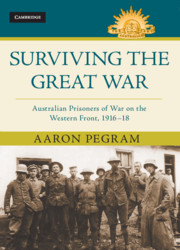Book contents
- Surviving the Great War
- Other titles in the Australian Army History Series
- Surviving the Great War
- Copyright page
- Contents
- Figures, maps and tables
- Preface
- Acknowledgements
- A note on casualty statistics
- Glossary
- Map
- Introduction
- Chapter 1 Raising the white flag
- Chapter 2 The reciprocity principle
- Chapter 3 Giving the game away
- Chapter 4 Saving lives
- Chapter 5 Challenging the Holzminden illusion
- Chapter 6 Well fed and plenty of freedom
- Chapter 7 Hun haunted?
- Conclusion
- Book part
- Notes
- Bibliography
- Index
Introduction
Published online by Cambridge University Press: 12 November 2019
- Surviving the Great War
- Other titles in the Australian Army History Series
- Surviving the Great War
- Copyright page
- Contents
- Figures, maps and tables
- Preface
- Acknowledgements
- A note on casualty statistics
- Glossary
- Map
- Introduction
- Chapter 1 Raising the white flag
- Chapter 2 The reciprocity principle
- Chapter 3 Giving the game away
- Chapter 4 Saving lives
- Chapter 5 Challenging the Holzminden illusion
- Chapter 6 Well fed and plenty of freedom
- Chapter 7 Hun haunted?
- Conclusion
- Book part
- Notes
- Bibliography
- Index
Summary
Towards the end of Somme Mud, Edward Lynch’s fictionalised memoir of fighting on the Western Front, the book’s protagonist, Nulla, encounters a group of British and French soldiers who had spent the previous three years as prisoners of war. Among them is a ‘tall, gaunt figure’ who sways up to Nulla and introduces himself as an Australian who ‘got knocked’ and was taken prisoner at Fleurbaix in July 1916. ‘Can you spare a couple of tins of bully beef?’ he asks. Nulla looks pitifully on the ‘poor, half-starved wretches. All dirty yellow skin, hollow cheeks and sunken, hopeless eyes.’ He gives food and cigarettes to these ‘scarecrows on legs’ that clutch with ‘long, claw-like, grasping fingers that shake’. Nulla was appalled. ‘How we pity these poor beggars! How we thank our lucky stars we escaped the ordeal of being prisoners of war. We look upon [these] fellow men reduced to skin-clad skeletons and are sickened.’
Keywords
- Type
- Chapter
- Information
- Surviving the Great WarAustralian Prisoners of War on the Western Front 1916–18, pp. 1 - 17Publisher: Cambridge University PressPrint publication year: 2019

